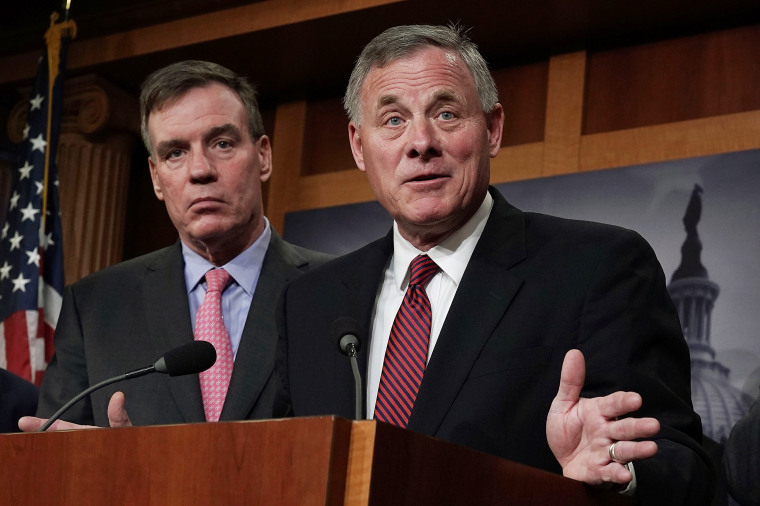WASHINGTON — The Senate Intelligence Committee issued a bipartisan report Tuesday calling for Congress to consider new laws designed to prevent foreign interference on social media — the culmination of a two-year investigation into how Russian intelligence agencies sought to manipulate American public opinion in the 2016 election.
The report, released by the committee's chairman, Richard Burr, a North Carolina Republican, and Mark Warner, a Virginia Democrat, recommends that new legislation should be considered, including requirements that social media companies publicly disclose the identities of those who purchase political advertisements, something television stations have long been required to do.
Click here to read the report.
A bill sponsored by Warner and Republican Sen. Lindsey Graham to do that, known as the Honest Ads Act, is pending, but has not moved in the Senate.
The 85-page report takes a comprehensive look at how the Internet Research Agency, a so-called troll farm based in Russia, used automated and fake social media personas in an attempt to sow discord, hurt Hillary Clinton and help Donald Trump.
The committee found that Russian social media activity "was overtly and almost invariably supportive of then-candidate Trump to the detriment of Secretary Clinton's campaign."
And the activity continues, the committee found.
"By flooding social media with false reports, conspiracy theories, and trolls, and by exploiting existing divisions, Russia is trying to breed distrust of our democratic institutions and our fellow Americans," Burr said in a statement. "While Russia may have been the first to hone the modern disinformation tactics outlined in this report, other adversaries, including China, North Korea, and Iran, are following suit."
Warner added, "As was made clear in 2016, we cannot expect social media companies to take adequate precautions on their own. Congress must step up and establish guardrails to protect the integrity of our democracy. At minimum, we need to demand transparency around social media to prevent our adversaries from hiding in its shadows."
The report confirms the findings of private researchers that African-American voters were targeted by the troll farm more frequently than any other group, in an apparent effort to suppress the vote and help Trump.
At a rally in Pennsylvania in December 2016, then President-elect Trump thanked black voters for failing to turn out for Clinton at the same rate they did for Obama.
"They didn't come out to vote for Hillary. They didn't come out. And that was a big," Trump said. "So thank you to the African-American community."
Two-thirds of the Internet Research Agency's Facebook ads were focused on race, the report found, adding that black voters were targeted with messages such as: "Don't Vote for Hillary Clinton," "Don't Vote At All," "Why Would We Be Voting," "Our Votes Don't Matter," and "A Vote for Jill Stein is Not a Wasted Vote."
While much of the report's analysis of how the Russians used social media in 2016 wasn't new, the document includes the first set of bipartisan recommendations to come out of a close look at what happened.
In addition to weighing new laws, the committee recommended that the executive branch "publicly reinforce the danger of attempted foreign interference in the 2020 election" and "establish an interagency task force to monitor foreign nations' use of social media platforms for democratic interference and develop a deterrence framework."
While the FBI and other agencies have sought to tackle the issue of foreign manipulation on social media, there has been no whole-of-government approach led from the White House, principally because President Trump has not wanted to focus on an issue that he feels undermines the legitimacy of his 2016 victory, officials have said.
Trump has never acknowledged the extent to which Russian intelligence services and their proxies intervened in the 2016 election, and at times he has denied that it happened.
The Senate Intelligence Committee in July released its first volume on Russian attempts to compromise the security of election systems. Future volumes will cover how the intelligence community determined that Russia was responsible; counterintelligence issues, including the Trump campaign's contacts with Russians during the campaign; and how the Obama administration responded to foreign election interference, officials said.
The Senate is running the only bipartisan Congressional investigation into the 2016 campaign. The House Intelligence Committee's investigation has broken down along party lines and the two sides are not cooperating.

